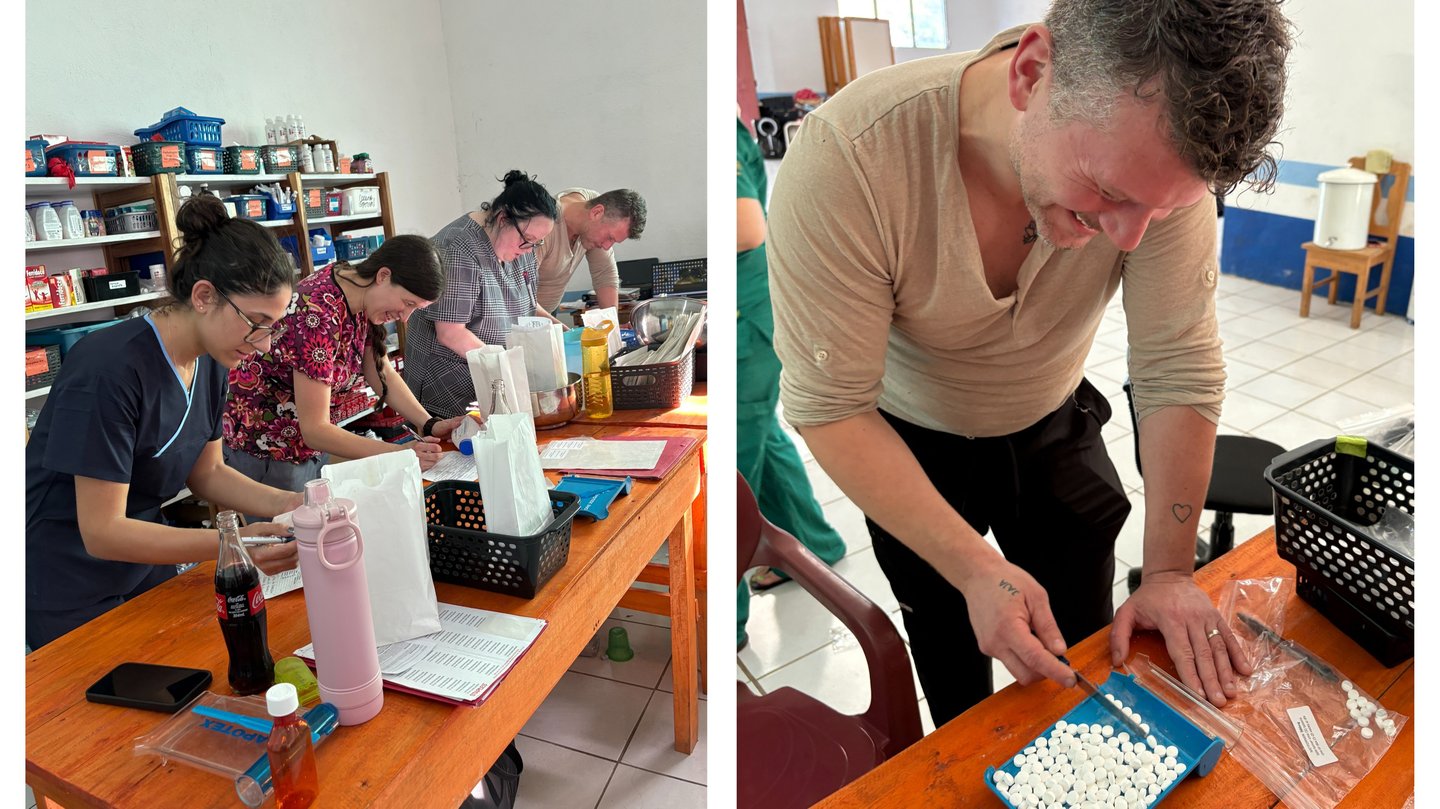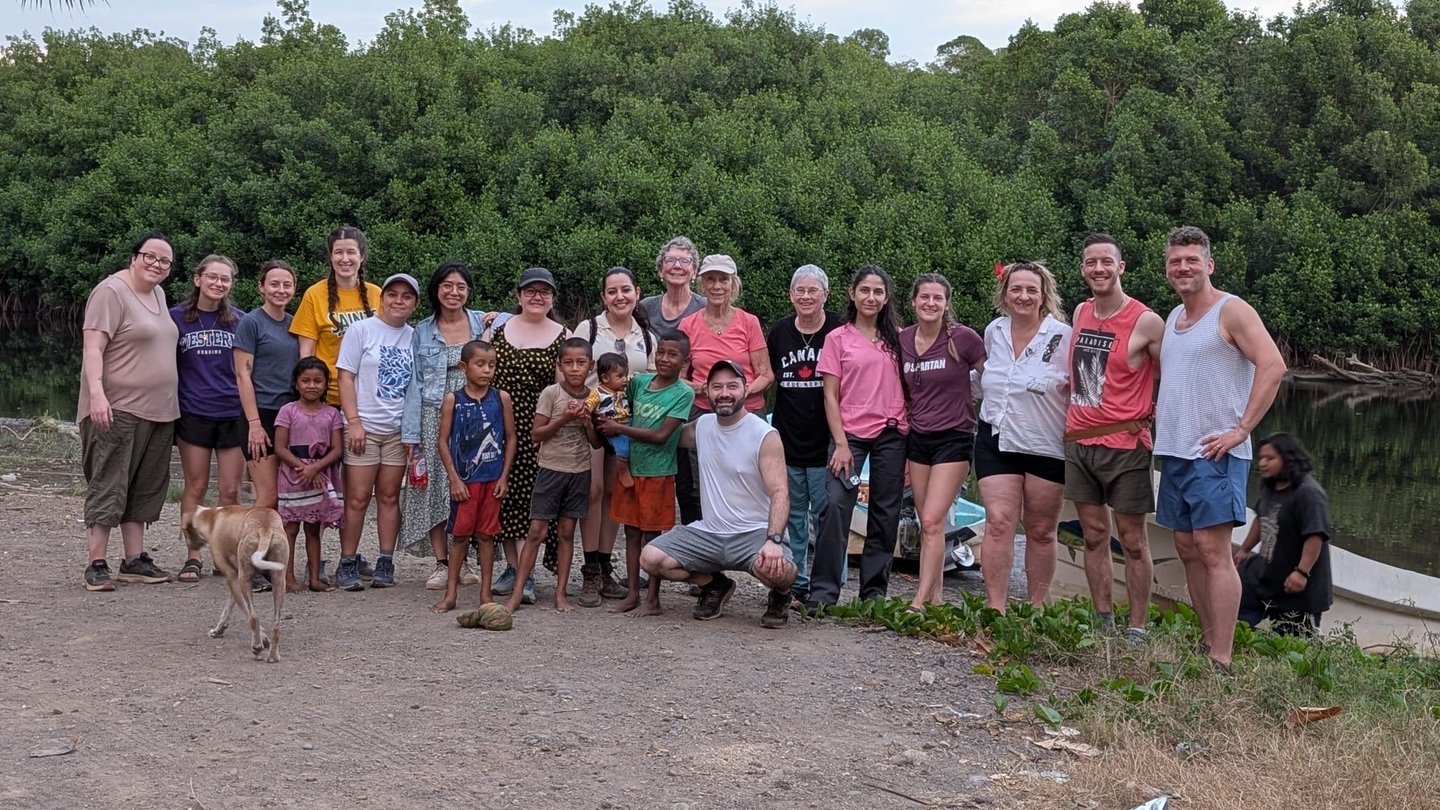Mission to Guatemala leaves lasting impression on pharmacy techs
In January, St. Clair College second-year pharmacy technician students Sanaa Shaaya, Jerry Sikl and Morgan Merritt got the opportunity to participate in a 10-day mission through Guatemala Hope | Canadian Non-Profit Organization to provide essential healthcare and medication to people in the remote village of El Triunfo, Guatemala. They were accompanied by faculty member Dr. Kaitlyn Harnden.
Upon their return, the students and Dr. Harnden took the time to answer some questions from the Canadian Healthcare Network about their unique experience.
What were your key learnings from the trip?
Jerry Sikl: This trip was an incredible opportunity for me to continue learning and growing, both personally and professionally. I believe that self-improvement is a lifelong journey, and experiences like this help shape my understanding of the world and my future profession. Empathy is at the heart of all jobs in the healthcare world and this trip reinforced just how vital it is. Seeing people in their everyday environments, understanding their challenges firsthand, and recognizing the impact that even small changes can make was truly eye-opening.
Read: Educators prepare students to practise under new ACP practice standards
One of the most impactful moments was visiting a neighbouring village to deliver medication to those who couldn’t make it to the clinic due to scheduling conflicts or being too ill to travel. These individuals relied on us to bridge that gap in care. Seeing them in their homes, in their natural surroundings, gave me a deeper appreciation for their daily struggles and reinforced the importance of accessibility in health care.
Another eye-opening experience was sitting with the engineers during lunch and listening to their discussions about improving the local water supply. Seeing actual Petri dishes of the untreated water compared to the filtered version was shocking, but even more powerful was witnessing how their efforts directly improved public health. Since we were dispensing medications, we could see the connection between clean water and fewer health issues firsthand. These experiences, among many others, reinforced the importance of interdisciplinary collaboration and showed me how even small improvements can make a significant difference in people’s lives.
Sanaa Shaaya: I learned to work and improvise in an environment that has nothing. I learned how to be more patient and understanding. I learned some words in Spanish to be able to respond to kids and families. I learned to be more appreciative of what I have and not to take anything for granted. I learned to live in the moment and not worry. I learned to be more kind and thankful.
Read: Tech Talk Newsletters
Morgan Merritt: I definitely learned a lot. I had to know Spanish in order to translate the prescription labels that had to be placed on their prescription bags so they could know how to take the medication properly. I got to learn how to translate prescriptions that would be written by doctors in order to obtain the proper medication(s).
What did you bring back from the trip to enhance your practice in Canada?
Sanaa Shaaya: The knowledge of being able to work with what I have and being able to dose kids for worms and parasites. I learned more about a few medications and how we can interchange them as we were running low on supply. I learned how to work at a very fast speed and with 100% accuracy.
Jerry Sikl: This trip to Guatemala has given me so much more than just experience—it has reignited my motivation as a student and my future pharmacy technician prospects. Seeing firsthand the impact that proper medical care can have on underserved communities has strengthened my desire to complete this program and obtain my full license. I want to master my craft, not just for myself but to be a resource for those in need. More than that, I feel a deep desire to promote this trip to others, to encourage them to see it not as a vacation but as an opportunity for real personal growth. While self-discovery and enjoying new experiences are valuable, I believe the true purpose of a journey like this is to understand others, to step into their reality, and to gain a perspective that the Western world often overlooks. Too many of us are consumed by the pursuit of social media status or the relentless grind of "hustle culture," while remaining disconnected from the struggles of people beyond our borders. This trip has been a powerful reminder of what truly matters, and I hope to carry that forward—not just in my career, but in the way I live my life.
Morgan Merritt: To not take anything for granted and to appreciate what I have and how easy it is to obtain medical care, where in Guatemala they would have to travel hours to possibly be seen in the hospital or even wait until Guatemala Hope arrives.
What was the most rewarding aspect of the trip for you?
Sanaa Shaaya: The most rewarding was that I came to Canada from Iraq in 2010, and I remember how my family and I would also not have the privilege of being able to see a doctor any chance we got; we would also line up to see some kind of healthcare professional and be forced to take medications and vaccinations that the doctor there thought was best. Being able to be one of the students to go and help a village and supply proper care and medication and advice was the best 10 days of my life.
Jerry Sikl: One of the most rewarding aspects of this trip was the deep personal connection I felt to the people I was helping. Being half Latino, with a mother from Costa Rica who grew up poor, I’ve heard countless stories of the hardships she faced as a child. In many ways, it felt like I was reaching back in time, offering help to a younger version of her. That sense of connection made every moment even more meaningful. I’ve always believed in leading through example, and as a father of two, I couldn’t help but think about how my actions might inspire my own children. I hope that one day, they too will feel a calling to give back, to step outside their comfort zones, and to make a difference in someone else’s life.
What impressed you the most about the mission?
Sanaa Shaaya: Seeing all the kids and families in Guatemala all get together to come to the clinic in El Triunfo and how everyone was so friendly. They would meet each other and play together as they were waiting for the doctors. Also, how kind and caring everyone is and how they're all living in the moment.
Morgan Merritt: What impressed me the most was learning how these people live and how happy they are with what they have/don't have. Learning that they use things around the house to treat injuries that normally wouldn't be used.
Jerry Sikl: Going into this mission, I wasn’t entirely sure what to expect. I consider myself naturally introverted, with occasional bursts of extroversion when I feel comfortable. Meeting the people on this trip made me feel at ease in a way that allowed that extroverted side of me to come out more often. That was something special.
One thing I’ve always noticed about people is how easy it is to spot judgment. It’s one of those things you can feel right away, and I’ve learned to just ignore those who carry it. But here, I didn’t really see that. There was a sense of openness and acceptance that made it easy to just be myself.
Sure, I could talk about how incredible the facilities were, how great it felt to have meals provided each day, fresh water to drink and shower in, or how organized and safe everything was. And while all of that mattered, the most important part for me was the people—how they made me feel. This trip wasn’t just about the mission itself; it was about the connections formed along the way. I loved that I felt comfortable and could be myself. And that, more than anything else, is what impressed me. It didn't matter if you were a doctor, held a PhD, were a nurse, a civil engineer, student or a volunteer. No one cared—everyone was just human, everyone was equal. It was a beautiful thing.
Dr. Kaitlyn Harnden, Faculty member, Pharmacy Technician Program, St. Clair College, who accompanied the students:
What impression did this mission leave on the students? What did they learn from it?
The students were profoundly affected by the experience, and witnessing their transformation firsthand was incredibly powerful. They saw the devastating effects of poverty and limited medical resources, as well as the significant impact they had on the lives of the villagers. While they applied their prescription-dispensing skills learned in their program, an equally—if not more—important focus was on soft skills. Adaptability and flexibility were crucial as they navigated an ever-changing inventory. Communication, particularly overcoming language barriers, was emphasized, allowing them to explore diverse ways of connecting with others. Additionally, the students honed their critical thinking, problem-solving, and teamwork skills—not only within the pharmacy but as part of a broader healthcare team.
How did the students contribute to the mission, and how was it received by the villagers and healthcare professionals?
Guatemala Hope is guided by core values and beliefs, all centred on improving the lives of the villagers to the best of our ability. The students played a pivotal role in this mission! The villagers expressed immense gratitude toward the entire medical team, especially the students. Meaningful connections were formed, and it was heartwarming to see students engaging with the children—playing, laughing and building friendships.
Do you think this type of mission could become a regular event for pharmacy technician students?
I would love it if we can continue to strengthen the partnership that St. Clair College has made with Guatemala Hope. I would love to get more of our amazing students involved from various disciplines, as we have so much to offer.
Read more about the mission at 'Our students have come back changed': St. Clair Pharmacy Technician students provide hope and medicine in Guatemala | St. Clair College


